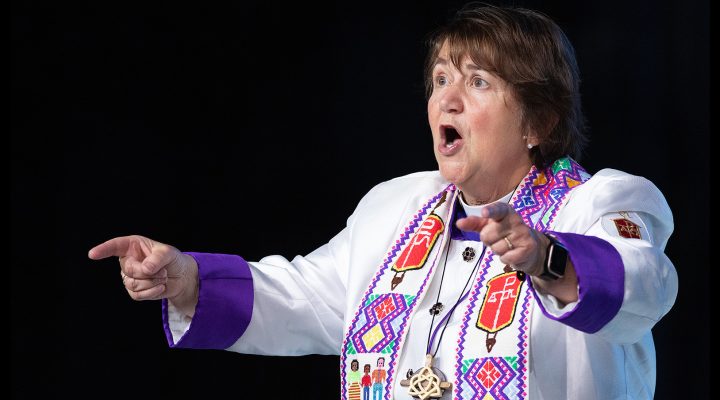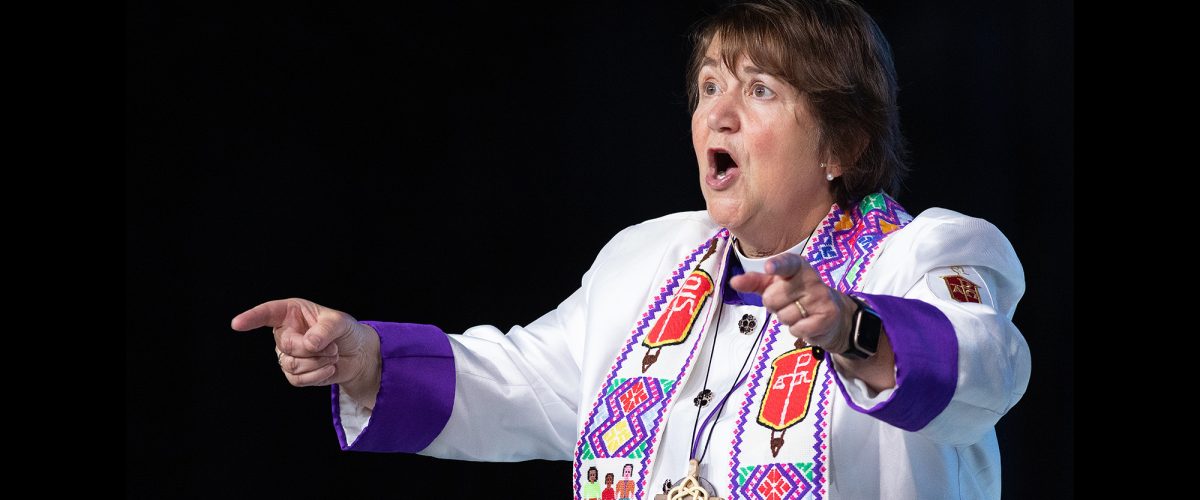The 52-year battle over the exclusion of LGBTQ people from full participation in The United Methodist Church turned a major corner April 30 through a parliamentary move designed to adopt measures that have broad consensus from legislative committees.
The battle isn’t over yet because the source of the conflict — a section of the Social Principles holding “the practice of homosexuality is incompatible with Christian teaching” — remains to be succeeded by the Revised Social Principles. Five of the six petitions enacting new guidelines for Christian living have been adopted on consent calendars to date. The final part, titled “The Social Community,” is on the assembly’s calendar for a vote, possibly by May 1, according to John Hill, interim executive of the General Board of Church and Society that has guided the revision.
The General Conference is in the second of its two-week gathering in Charlotte, N.C.
After half a century of raucous, rancorous debates, advocates for removal of restrictive language and those who’ve been directly affected by it were cautiously hopeful the original source of discrimination was about to fall after the April 30 vote.
Multiple petitions to remove what opponents have called “the harmful language” of LGBTQ discrimination were adopted by a vote of 667 to 54. The vote removed many provisions of the so-called Traditional Plan adopted by the special called General Conference in 2019. Those harsher restrictions set off a wave of rebellion among U.S. annual conferences that resulted in the election of more cooperative delegates now deciding the church’s future.
Among the items revoked or adapted by the consensus vote:
- Repeals a ban on churchwide funds from going to LGBTQ causes, replacing it with a ban on UMC fund going toward causes that reject LGBTQ persons.
- Amends ordination qualifications to allow district committees and annual (regional) conferences to endorse LGBTQ clergy candidates.
- Strikes language prohibiting bishops from consecrating “self-avowed and practicing homosexuals” and requiring ordained ministry boards to examine candidates as regarding their sexuality.
- Allows an option for elders who are LGBTQ to be appointed across annual conferences lines, when they cannot be guaranteed a safe appointment in their home conferences.
- Revokes language requiring specific minimum punishments for performing same-gender weddings.
- Enacts a moratorium on current church trials and complaints in process concerning human sexuality.

Bridget Cabrera
Bridget Cabrera, executive director of Methodist Federation for Social Action, said the adoption of multiple petitions was “a very, very encouraging thing.”
“We have been working on this for decades and decades, and to see something of this momentous shift in our beloved United Methodist Church is a very, very encouraging thing,” she said. “And for it to pass on the consent calendar of all things.”
Cabrera said she sees the broad consensus behind the vote as a sign that the UMC has entered a new stage.
“We are seeing a shift in our United Methodist Church back to who we have always been — a denomination that that has had open hearts, open minds and open doors,” said Cabrera, referring to a longtime UMC slogan.
“However, we have intentionally been a target of a group of folks that have sought to see to the destruction, the breaking apart of the United Methodist Church,” she continued. “I think what we’re seeing here at this General Conference is our delegates and our church saying we want to continue to be united and we want to go back to being the United Methodist Church that continues to welcome all the people.”

David Meredith
David Meredith, a retired clergy member of the West Ohio Annual Conference, said the April 30 vote means “my church is not out to ‘get’ me anymore.”
Meredith was the target of a church trial because he is a married gay man. At the time of the trial, he served Clinton UMC in Ohio, where parishioners consistently praised his ministry and rejected the church legal actions brought against him.
What’s also significant, he added, is that the restrictive provisions have “become history for us, no longer our present reality. And they begin to create space in which this denomination can move into its next iteration as a Wesleyan people as followers of Christ.”
Meredith said the removal of LGBTQ restrictions works in tandem with the approval of worldwide regionalization to become “a generous acceptance.”
“Removing the stuff that’s really hurtful levels the playing field across all of those regions in context,” he said.
“What’s historic for me, both in my heart and in my experience, is I’ve just experienced something in United Methodist ministry that I have never, ever experienced before, and I’ve been to 11 General Conferences,” Meredith continued. “It’s not just about me, it’s not about all of my friends. It’s about people who the church already hurt who did not live to see this day, who have left the church because they couldn’t take it anymore. This is really big for us.”
Related articles:
UMC gives first approval to restructuring plan
Top issues for United Methodists’ Global Assembly taking shape
One quarter of U.S. United Methodist churches have disaffiliated
United Methodists will decide realigning church’s structure, authority in 2024


